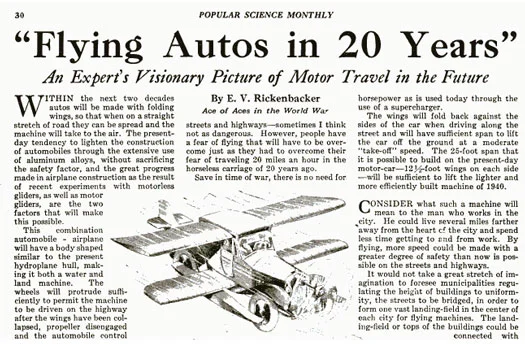The Unpredictability of Innovation
 Yajat Gulati
Yajat GulatiTable of contents

It's human nature to be captivated by the next shiny, new thing. When it comes to groundbreaking technological advancements, our excitement, curiosity, and imagination can run rampant. The recent release of ChatGPT and the success of large language models have some people, including myself, heading for the panic button, fearing job loss or, worse, an AI dystopia. But a brief look at history shows that technological innovation rarely unfolds as we initially imagine, and the hysteria surrounding such advancements almost always proves to be unfounded.
In this journey down memory lane, let's revisit major technological innovations in which the future did not pan out as predicted.
1. Personal Flying Cars
Our fascination with cars that fly goes back to the early days of aviation. After the invention of the airplane, many expected personal flying cars to soon dominate the skies. Although aviation technology has advanced significantly, we're not zipping around in our hovercrafts just yet.
2. Jetpacks
The jetpack, once imagined as the personal transportation device of the future, has never really taken off (pun intended). Safety, fuel, and cost concerns have kept this sci-fi dream grounded in reality.
3. Nuclear Power
When the atomic era dawned, many saw nuclear power as an endless source of clean energy. Though it has indeed made progress, safety issues and environmental concerns have prevented its widespread adoption.
4. Fusion Power
Often hailed as the holy grail of clean energy, fusion power was all the rage in the 1950s. Today, despite remarkable advancements, we still grapple with the commercial viability and scalability of this energy source.
5. Space Colonization
The awe-inspiring moon landing in 1969 kickstarted grand aspirations of lunar bases and Mars colonies. Alas, these celestial dreams have yet to materialize as we continue to face funding and technological challenges in space exploration.
6. Virtual Reality
Early proponents of virtual reality imagined it transforming every aspect of life, from business to entertainment. While VR has indeed come a long way, its use and adoption remain far from ubiquitous.
Lastly, talking about GPT as well, It's also worth noting that OpenAI's CEO Sam Altman recently confirmed that the company is not currently training GPT-5, the presumed successor to GPT-4. In fact, Altman emphasized that OpenAI is focusing on expanding the capabilities of GPT-4 while also considering the safety implications of their work.(https://www.theverge.com/2023/4/14/23683084/openai-gpt-5-rumors-training-sam-altman)
So now what?
In conclusion, history has taught us time and time again that while we may dream up all-encompassing outcomes for new and groundbreaking technologies, predicting their actual impact on our lives is a tall order. From personal flying cars to space colonization, we've frequently overestimated the influence of various advancements, just as we have with AI and ChatGPT.
This doesn't mean AI won't lead to job displacement—it already has in some cases—but history indicates that as a society, we'll continually adapt to and evolve alongside technological changes. Job opportunities will grow in new fields as we traverse the uncharted territory created by AI-driven innovation.
So, rather than feeling overwhelmed by panic or anxiety surrounding the potential dystopia we may think AI will bring, it's important to remember that most of these futuristic scenarios seldom come to fruition as expected. Our collective future is not dystopian, but rather a continuous journey where we learn, adapt, and create the harmony required to sustain our ever-evolving world.
(...is what I tell myself to sleep at night anyway what do I know I'm just 18 lmao)
Subscribe to my newsletter
Read articles from Yajat Gulati directly inside your inbox. Subscribe to the newsletter, and don't miss out.
Written by
